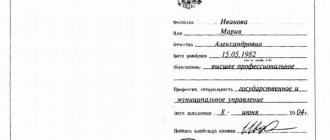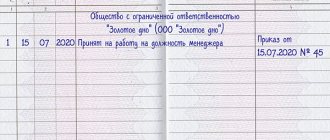What do you need to know about the interview?
An interview is a personal communication between the employer (or his representative) and the applicant (i.e., the one looking for a job). It allows you to better understand how well the candidate is suitable for the proposed vacancy. The applicant also receives valuable information: he can tour the office, learn about the atmosphere in the team, and ask the potential employer about growth prospects.
Both the head of the company and a special employee – a recruiter – can communicate with the applicant. The interview usually takes place in an interview format and consists of 5 main stages:
- Acquaintance
. The applicant and the recruiter get to know each other, establish contact and prepare the atmosphere for communication. The recruiter briefly reminds you what vacancy is being discussed to avoid misunderstandings. - Questions for the applicant
. This is the most important part that determines your chances of getting hired. - Story about the vacancy and the company
. The recruiter tells the candidate in detail about the vacancy and career prospects. The presence of this stage implies that the applicant is interesting to the employer. - Questions from the applicant
. The applicant can clarify important details to understand the prospects of working in the company. - Discussion of the action plan
. At this stage, organizational issues are discussed: further communication, additional interviews, deadlines for returning to work, etc.
Today, many companies (including corporations such as Apple, Amazon and Facebook) conduct remote interviews via video chat when hiring employees. But only accomplished specialists with good recommendations can count on such a format, and yesterday’s student has to personally visit the employer’s office.
First minute
So, you have met the person who will conduct the interview. Perhaps this will happen in the corridor or you will have to look for an office yourself. Immediately prepare yourself for the fact that the employer or personnel employee is not obliged to be friendly with you. Quite the opposite often happens. Most likely, there were already candidates before you, and besides, for them this is a regular working day. The human factor comes into play: at the time of the appointment, they may be tired, nervous, annoyed, irritated.
At first glance, try to assess their mood and state in order to behave accordingly. If the HR manager smiles at you, smile back. If the employer frowns, there is no need to demonstrate deliberate gaiety; show yourself as a serious person.
Be sure to say hello politely and in a friendly tone.
Many male job seekers are unsure whether to shake the hand of the male interviewer. According to the rules of etiquette, this is done only if he offers his hand first. Otherwise, the initiative will be viewed as familiarity and excessive self-confidence.
Under no circumstances should you jabber or overwhelm the employer with questions about where to send your documents, whether they need your photograph for their personal file, etc. If this is your first interview, first establish contact. To do this, it is enough to limit yourself to a short but pleasant phrase. For example: “Your office is so conveniently located - it wasn’t difficult to find you,” or “What a bright room!”, or “You have an original interior.”
You can sit down only after you are asked to do so and indicated where.
How to prepare for an interview?
Even if you are an excellent specialist with work experience and good recommendations, you should think in advance about how to pass the interview with the best result. Careful preparation greatly increases your chances of success, so be sure to work on the following:
- Collect a portfolio
. Finished work speaks best of professional competence. - Work on your self-presentation
. Write down your own strengths and weaknesses in a notebook. Remember serious achievements that demonstrate your professionalism and other important qualities (determination, ability to concentrate in a stressful situation, etc.). Carefully study the requirements of other employers for similar vacancies. - Prepare your clothes
. You need to dress neatly, but modestly. Makeup should be discreet; you should not overuse flashy accessories or perfume. - Think over the route
. You cannot be late for an interview, so make sure in advance that no force majeure will prevent you from arriving on time. - Take a rest
. Tension is not the best assistant in passing an interview. Try to relax, resolve distracting issues, and get a good night's sleep.
It is also worth preparing some documents and accessories:
- Summary
. Even if you have already submitted an electronic version, a paper copy will not hurt. - Diploma
. Sometimes employers want to make sure that an applicant is honest about their education information. - Passport
. May be required to obtain a temporary pass to an office building or a sensitive facility. - Certificates
. If you have taken professional courses and attended seminars, supporting documents will be useful. - Notepad (and pen)
. By taking notes throughout the interview, you can gather valuable information to work on your mistakes.
How to behave during an interview
There are several basic rules to make a positive impression on a potential employer. To feel comfortable following them during a conversation, carefully read the list several times.
- Keep your posture
. Don't lift your chin proudly. Just straighten your shoulders and look straight - this is how a person looks most pleasant. - Smile
. The smile should be friendly and unobtrusive; this will create the impression of a positive person without seeming frivolous. - Be casual
. When you enter the room, say hello. Don't look around, look at the recruiter. Sit in front of him, moving the chair so that it is more convenient to communicate. When communicating, make eye contact, do not cross your arms, and watch your feet. - Be concise
. The recruiter is not interested in your detailed biography. Talk only about what relates to the vacancy: why you chose this profession, why you want to work in this company. Tell us about the courses you took, the professional literature you read, and your work experience. - Don't criticize your previous employer
. This is a common mistake made even by experienced professionals. Try to avoid negativity when explaining why you left your previous job. There is no need to talk about your tyrant boss and incompetent colleagues. - Don't hide your shortcomings
. Self-criticism is important in any profession, so the question about shortcomings in interviews is asked quite often. And you must be prepared to respond meaningfully.
Tips on how to pass an interview often recommend asking counter questions to the recruiter in order to increase your “value.” Newcomers often take this recommendation too literally and behave defiantly, making an unpleasant impression.
To avoid this mistake, do not interrupt the recruiter or try to seize the initiative. But be sure to ask questions when appropriate. This way you will learn useful information and demonstrate interest.
Here's what you should ask first:
- What candidate qualities are most important?
- What kind of person do you want in this position?
- What are the work priorities for this position?
- What are the challenges facing the department in which I will work?
- What is the company's development strategy?
Please note the end of the interview. Agree on feedback, ask when to expect a call. This can really influence the decision because it demonstrates that you are serious about your intentions.
Personal problems
The last thing a future employer wants to know about is the employee’s problems. Therefore, putting pressure on pity, talking about the difficult situation in which you are now, a bunch of small children and sick parents who need to be fed, is a direct way not to get a position.
Nobody needs employees with problems.
Try not to mention:
- illnesses that may interfere with the performance of duties at work,
- small children who will need to be left at home regularly,
- sick relatives,
- bad colleagues, because of whom I had to leave my previous job,
- a terrible past boss who fired without understanding it.
The employer is looking for a person who will solve current problems and resolve problems, and not someone who will bring new ones.
Popular interview questions
There are common questions that are asked in different companies, regardless of the industry. It is advisable to prepare answers to them in advance. Here are a few of the most frequently asked questions during interviews.
Why did you leave your previous job?
This question may be one of the first to be asked, and it is quite dangerous. The interviewed applicant finds himself in a difficult situation, and any careless answer may make him appear incompetent, irresponsible, confrontational or childish. The following answer options are relatively “safe”:
- Responsibilities differed from those originally stated. The work was not bad, but I am interested in working specifically in this specialty.
- At my previous position in the team, there were internal conflicts that interfered with teamwork. I want to work in a well-coordinated team that works to solve assigned problems, and not to resolve conflicts.
- I want to continue to develop as a specialist, and in my previous position there was no such opportunity.
Why do you want to work with us?
This is also a dangerous question. Most likely, you will give an honest answer without guile: comfortable schedule, good pay, convenient geographical location. But by asking such a question, the employer wants to understand why this particular organization attracted you. You should not name the advantages that any competitor may have.
Good answer options are:
- Your organization has a good reputation;
- I use your products/services. I like your meticulous attitude to quality.
- You were recommended to me by a friend who works here.
- I attended your seminars (read your blog, magazine publications). I like the activities and social activities of the company and want to be a part of it.
To increase your chances of getting a position, you should think in advance about how to pass an interview at a given company: collect as much available information as possible and choose the most significant advantages.
Where do you see yourself in the company in 5 years?
Often, the applicant views the proposed vacancy as a springboard that will allow him to get a job in a more prestigious company in 3-5 years. When answering this question, it is important to emphasize the desire to work for this employer in a higher position.
Name your best qualities
Be honest and don't overdo it. Name only those features that you sincerely consider to be your advantages. It is enough to name 3 qualities.
Examples of successful options:
- Responsibility
. I carry out all assignments, strictly comply with requirements, and do not violate deadlines; - Versatility
. I have been working in this field for more than 5 years. At the previous position, he performed part of the duties in related specialties. I study psychology as a hobby and am interested in current marketing research, which can help in my work. - Sociability
. I know how to get along with people; at my previous job I was responsible for team building activities. The bosses recognized the results of my work and paid a bonus for them.
What salary are you expecting?
There is also a catch here. By applying for too high a salary, you reduce your chances of getting a position, and by calling a small amount, you risk devaluing yourself as a specialist. The best way to determine the optimal salary is to study similar vacancies, calculate the average value of the offered salaries and increase it by 10-20%.
General Tips
A few more general points on how to win over:
- Be internally confident in your abilities, do not allow failure in your thoughts - this will affect your demeanor and convince the employer that you know your worth.
- If you start to get nervous, abstract yourself. Imagine yourself and the interviewer in an informal setting: on the beach, in an amusement park. This will relieve tension.
- If you can't look straight into your eyes, choose a point on the bridge of your nose or in the center of your forehead.
- If you don't like the person you're talking to or they annoy you, don't show it.
- Don't let yourself belittled. Protect your dignity.
- Don't be surprised by anything and don't react too emotionally to unexpected situations.
Solve any interview situation from the point of view of the position for which you are applying.
How to increase your chances?
An interview is a kind of competition where the strongest wins. And the best way to win is to take advantage of the experience of someone who has already won. If you want to learn how to successfully pass any interview, learn how to competently write a resume, and effectively demonstrate your strengths, I recommend that you take the training course: “How to find your dream job.”
The course consists of 14 lessons. The author of this course, Sofya Kuzina, reviewed thousands of resumes and conducted dozens of interviews. And as a student looking for a job, she interviewed with dozens of companies. This course will reveal secrets on how to attract the attention of HR to your resume, how to successfully pass an interview and receive an “interesting offer” in 9 cases out of 10.
After the interview
If the communication was successful, you introduced yourself correctly and answered all the questions correctly, your chances of getting the job are quite high. However, an employee is rarely hired immediately after an interview. Usually the recruiter gives an approximate deadline for making a decision and says, “We will contact you.” Many people perceive this phrase as a polite refusal, and this deals a strong blow to their self-esteem.
But if you failed the interview, they would tell you so. It’s just that any company usually interviews several people, and the final decision is made after communicating with all the candidates. Therefore, you can calmly wait for the call or use the time to look for other interesting vacancies.









